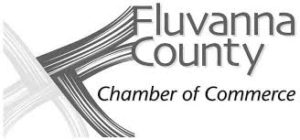Voters decide Nov. 6
By Heather Michon, Correspondent
With just days until the polls open, the Fluvanna Chamber of Commerce and county officials held a series of informational sessions at the Historic Courthouse in Palmyra on Wednesday (Oct. 24) to tell local business owners what to expect if voters pass the proposed meal tax.
The Board of Supervisors voted in August to put an ordinance on the November ballot for a meal tax of up to 4 percent.
 To begin to prepare local businesses for what will happen should the ordinance pass, Chamber President Rudy Garcia organized and led sessions throughout the day Wednesday. He was joined by Commissioner of Revenue Mel Sheridan and County Administrator Steve Nichols.
To begin to prepare local businesses for what will happen should the ordinance pass, Chamber President Rudy Garcia organized and led sessions throughout the day Wednesday. He was joined by Commissioner of Revenue Mel Sheridan and County Administrator Steve Nichols.
“Mel and I got together and said we need to let people know what this means and how it will affect them,” Garcia explained during the afternoon session.
Eleven people in all attended the three sessions, said Garcia. About half of them were business owners who would be impacted by the tax and the other half were interested taxpayers. The county has estimated that about 21 Fluvanna businesses would be affected by the tax.
The biggest concern of the business owners who attended and asked questions was how the meals tax would impact their operations. “I think the ones who came in already had an understanding that they were collecting and remitting taxes for the regular sales tax,” said Garcia. “They wanted to understand if they were going to be able to do it online.”
In contrast, the “overriding concern” of the non-business affiliated taxpayers in attendance was where “the money is going to go once the tax comes in,” Garcia said.
Neither the Chamber nor the county has taken an official position on the meal tax. The county is prohibited by law from voicing its opinion, and the Chamber has decided to remain neutral.
About half of Virginia’s 95 counties and all 38 independent cities have instituted a meals tax in recent decades.
Counties are capped at a 4 percent tax, while cities can charge up to 8 percent. Albemarle and Louisa counties both charge 4 percent; the City of Charlottesville currently charges 5 percent.
Consumers pay this tax on prepared foods meant for immediate consumption, which range from sit-down dinners to quick snacks.
Sheridan noted that it would also impact vendors who come in from outside the county for events like Old Farm Day, but churches and other nonprofits holding bake sales or other food-heavy fundraisers would be excluded.
Nichols projects $300,000 to $600,000 in annual revenue if the ordinance is approved by the voters.
If it does pass, Garcia and Sheridan outlined the steps businesses would need to take before the meals tax would go into effect July 1, 2019.
Most of that preparation involves making sure affected foods are properly coded to add the tax within businesses’ point-of-sale systems.
The state has a detailed list of what items are considered “prepared” foods and which are excluded. For example, a prepared sandwich would be subject to the tax, but an accompanying bag of chips or a fountain drink would not.
Sheridan’s office will set up an electronic form that businesses will fill in each month. “You tell us ‘we did this amount of money’ and you send in the check,” he said.
As an example, $5,000 worth of prepared food would generate $200 in taxes, payable to the county.
Garcia said one issue businesses would face would be an increase in credit card processing fees. Most processors charge a percentage on each transaction. If transactions rise 4 percent, so will the processing fees.
“The mechanics are not hard,” said Sheridan. “It’s just if the citizens want to do it.”
Whether citizens decide to do it is an open question. Sheridan added that many meals tax proposals have to go up for vote multiple times before passing.
If this proposal fails on Election Day (Nov. 6), the Board of Supervisors will have to wait three years to revisit the ordinance.
Editor Christina Dimeo contributed to this story.




